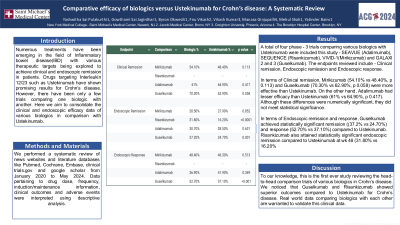Sunday Poster Session
Category: IBD
P0933 - Head-to-Head Comparison of Biologics vs Ustekinumab for Crohn’s Disease: A Systematic Review of Efficacy
Sunday, October 27, 2024
3:30 PM - 7:00 PM ET
Location: Exhibit Hall E

Has Audio

Yashwitha Sai Pulakurthi, MBBS, MD
Saint Michael's Medical Center
Newark, NJ
Presenting Author(s)
Yashwitha Sai Pulakurthi, MBBS, MD1, Byron Okwesili, MD2, Gowthami Sai Kogilathota Jagirdhar, MD3, Manasa Ginjupalli, MBBS, MD4, Fnu Vikash, MD, M.Med5, Vikash Kumar, MD6, Yatinder Bains, MD2, Mehul Shah, MD2
1Saint Michael's Medical Center, Newark, NJ; 2New York Medical College - Saint Michael's Medical Center, Newark, NJ; 3Saint Michaels Medical Center, Newark, NJ; 4The Brooklyn Hospital Center, New York, NY; 5Albert Einstein College of Medicine, New York, NY; 6Creighton University School of Medicine, Brooklyn, NY
Introduction: Numerous treatments have been emerging in the field of Inflammatory bowel disease(IBD) with various therapeutic targets being explored to achieve clinical and endoscopic remission in patients. Drugs targeting Interleukin 12/23 such as Ustekinumab have shown promising results for Crohn’s disease. However, there have been only a few trials comparing one biologic with another. Here we aim to consolidate the clinical and endoscopic efficacy data of various biologics in comparison with Ustekinumab.
Methods: We performed a systematic review of literature databases like Pubmed, Cochrane, Embase, clinical trials.gov and google scholar from January 2020 to May 2024. Data pertaining to drug dose, frequency, induction/maintenance information, clinical outcomes and adverse events were interpreted using descriptive analysis.
Results: A total of four phase - 3 trials comparing various biologics with Ustekinumab were included this study - SEAVUE (Adalimumab), SEQUENCE (Risankizumab), VIVID-1(Mirikizumab) and GALAXI 2 and 3 (Guselkumab). The endpoints reviewed include - Clinical remission, Endoscopic remission and Endoscopic response.
In terms of Clinical remission, Mirikizumab (54.10% vs 48.40%, p 0.113) and Guselkumab (70.30% vs 62.90%, p 0.058) were more effective than Ustekinumab. On the other hand, Adalimumab had lesser efficacy than Ustekinumab (61% vs 64.90%, p 0.417). Although these differences were numerically significant, they did not meet statistical significance.
In terms of Endoscopic remission and response, Guselkumab achieved statistically significant remission ((37.2% vs 24.70%) and response (52.70% vs 37.10%) compared to Ustekinumab. Risankizumab also attained statistically significant endoscopic remission compared to Ustekinumab at wk 48 (31.80% vs 16.20%)
Discussion: To our knowledge, this is the first ever study reviewing the head-to-head comparison trials of various biologics in Crohn’s disease. We noticed that Guselkumab and Risankizumab showed superior outcomes compared to Ustekinumab for Crohn’s disease. Real world data comparing biologics with each other are warranted to validate this clinical data.
Note: The table for this abstract can be viewed in the ePoster Gallery section of the ACG 2024 ePoster Site or in The American Journal of Gastroenterology's abstract supplement issue, both of which will be available starting October 27, 2024.
Disclosures:
Yashwitha Sai Pulakurthi, MBBS, MD1, Byron Okwesili, MD2, Gowthami Sai Kogilathota Jagirdhar, MD3, Manasa Ginjupalli, MBBS, MD4, Fnu Vikash, MD, M.Med5, Vikash Kumar, MD6, Yatinder Bains, MD2, Mehul Shah, MD2. P0933 - Head-to-Head Comparison of Biologics vs Ustekinumab for Crohn’s Disease: A Systematic Review of Efficacy, ACG 2024 Annual Scientific Meeting Abstracts. Philadelphia, PA: American College of Gastroenterology.
1Saint Michael's Medical Center, Newark, NJ; 2New York Medical College - Saint Michael's Medical Center, Newark, NJ; 3Saint Michaels Medical Center, Newark, NJ; 4The Brooklyn Hospital Center, New York, NY; 5Albert Einstein College of Medicine, New York, NY; 6Creighton University School of Medicine, Brooklyn, NY
Introduction: Numerous treatments have been emerging in the field of Inflammatory bowel disease(IBD) with various therapeutic targets being explored to achieve clinical and endoscopic remission in patients. Drugs targeting Interleukin 12/23 such as Ustekinumab have shown promising results for Crohn’s disease. However, there have been only a few trials comparing one biologic with another. Here we aim to consolidate the clinical and endoscopic efficacy data of various biologics in comparison with Ustekinumab.
Methods: We performed a systematic review of literature databases like Pubmed, Cochrane, Embase, clinical trials.gov and google scholar from January 2020 to May 2024. Data pertaining to drug dose, frequency, induction/maintenance information, clinical outcomes and adverse events were interpreted using descriptive analysis.
Results: A total of four phase - 3 trials comparing various biologics with Ustekinumab were included this study - SEAVUE (Adalimumab), SEQUENCE (Risankizumab), VIVID-1(Mirikizumab) and GALAXI 2 and 3 (Guselkumab). The endpoints reviewed include - Clinical remission, Endoscopic remission and Endoscopic response.
In terms of Clinical remission, Mirikizumab (54.10% vs 48.40%, p 0.113) and Guselkumab (70.30% vs 62.90%, p 0.058) were more effective than Ustekinumab. On the other hand, Adalimumab had lesser efficacy than Ustekinumab (61% vs 64.90%, p 0.417). Although these differences were numerically significant, they did not meet statistical significance.
In terms of Endoscopic remission and response, Guselkumab achieved statistically significant remission ((37.2% vs 24.70%) and response (52.70% vs 37.10%) compared to Ustekinumab. Risankizumab also attained statistically significant endoscopic remission compared to Ustekinumab at wk 48 (31.80% vs 16.20%)
Discussion: To our knowledge, this is the first ever study reviewing the head-to-head comparison trials of various biologics in Crohn’s disease. We noticed that Guselkumab and Risankizumab showed superior outcomes compared to Ustekinumab for Crohn’s disease. Real world data comparing biologics with each other are warranted to validate this clinical data.
Note: The table for this abstract can be viewed in the ePoster Gallery section of the ACG 2024 ePoster Site or in The American Journal of Gastroenterology's abstract supplement issue, both of which will be available starting October 27, 2024.
Disclosures:
Yashwitha Sai Pulakurthi indicated no relevant financial relationships.
Byron Okwesili indicated no relevant financial relationships.
Gowthami Sai Kogilathota Jagirdhar indicated no relevant financial relationships.
Manasa Ginjupalli indicated no relevant financial relationships.
Fnu Vikash indicated no relevant financial relationships.
Vikash Kumar indicated no relevant financial relationships.
Yatinder Bains indicated no relevant financial relationships.
Mehul Shah indicated no relevant financial relationships.
Yashwitha Sai Pulakurthi, MBBS, MD1, Byron Okwesili, MD2, Gowthami Sai Kogilathota Jagirdhar, MD3, Manasa Ginjupalli, MBBS, MD4, Fnu Vikash, MD, M.Med5, Vikash Kumar, MD6, Yatinder Bains, MD2, Mehul Shah, MD2. P0933 - Head-to-Head Comparison of Biologics vs Ustekinumab for Crohn’s Disease: A Systematic Review of Efficacy, ACG 2024 Annual Scientific Meeting Abstracts. Philadelphia, PA: American College of Gastroenterology.

